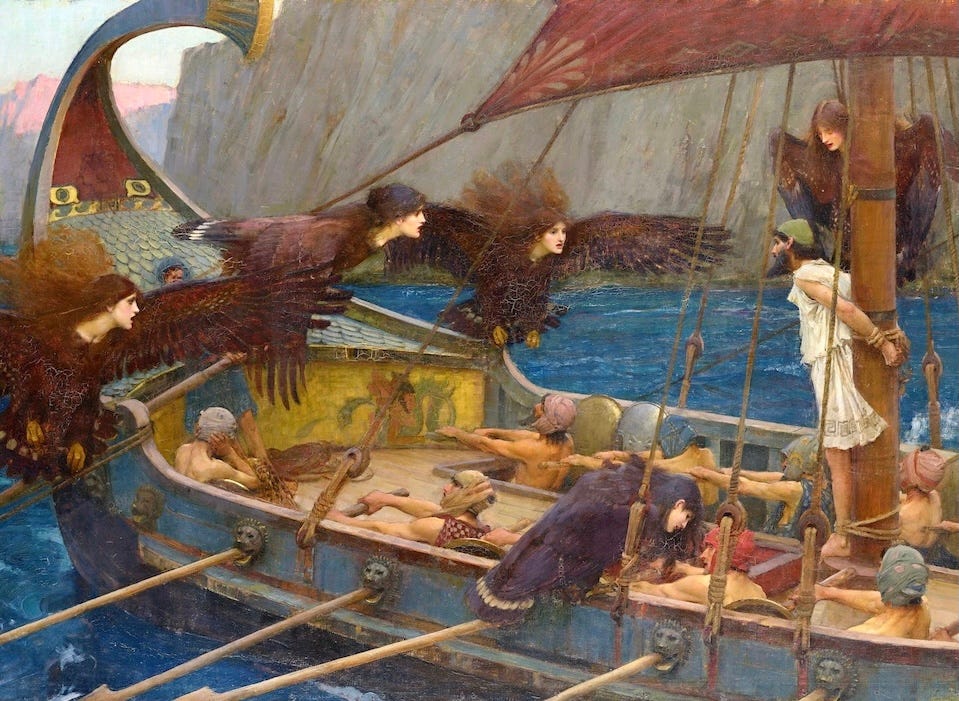The Odyssey's Warning on Temptation
The allure of forbidden knowledge
Even if you’ve never read the Odyssey, odds are you’re familiar with the story of the Sirens — the beautiful temptresses who lure sailors to their death with a seductive song.
Popular culture has long emphasized the sexual element of the Sirens’ temptation. But the thing is, that’s not in the text at all. In fact, most of what you think you know about the “seduction” of the Sirens is probably wrong.
So if it's not with their beauty that the Sirens tempt Odysseus, what is it?
Today, we dive into the text of Homer’s Odyssey to explore the deeper meaning of the Sirens — from the true meaning of their song to its hidden connection with the Garden of Eden, and what it can teach you about the frailty of human nature.
If you want to learn how to avoid the mistake that eventually costs Odysseus his life, read on…
Reminder: this is a teaser of our members-only deep dives.
To support our mission and get our premium content every week, upgrade for a few dollars per month. You’ll get:
Full-length, deep-dive articles every weekend
The entire archive of great literature, art, and philosophy breakdowns
Members-only podcasts and exclusive interviews
In the last year, we’ve written about everything from the nature of evil in Milton’s Paradise Lost, to J.R.R Tolkien’s sacred art of sub-creation, to C.S. Lewis’ case for why myths matter…
The Witch’s Warning
Book XII of the Odyssey begins with Odysseus and his men making their arrival at the island of Aeaea, where the sorceress Circe lives. They’ve just returned from the Underworld, where they were sent by Circe after their first encounter with her — in which she attempted to turn Odysseus and his men into swine.
Their second encounter goes undoubtedly better than the first, with Circe throwing a banquet that doesn’t turn Odysseus’s crew into animals. Then, after asking Odysseus to recount his adventures in the Underworld to her, she offers him some advice regarding the trials he’s about to face.
Circe warns Odysseus that he will have to decide how to navigate the dual-dangers of Scylla and Charybdis, but not before encountering the Sirens — “those creatures who spellbind any man alive.” Her full warning, as per the Robert Fagles translation of the Odyssey, is as follows:
First, you will raise the island of the Sirens,
those creatures who spellbind any man alive,
whoever comes their way. Whoever draws too close,
off-guard, and catches the Sirens’ voices in the air—
no sailing home for him, no wife rising to meet him,
no happy children beaming up at their father’s face.
The high, thrilling song of the Sirens will transfix him,
lolling there in their meadow, round them heaps of corpses
rotting away, rags of skin shriveling on their bones…
Race straight past that coast! Soften some beeswax
and stop your shipmates’ ears so none can hear,
none of the crew. But if you are bent on hearing,
have them tie you hand and foot in the swift ship,
erect at the mast-block, lashed by ropes to the mast
so you can hear the Sirens’ song to your heart’s content.
But if you plead, commanding your men to set you free,
then they must lash you faster, rope on rope.
-Odyssey, Book XII, lines 44-60
In warning Odysseus about the Sirens, Circe also tells him what he needs to do to overcome them: put beeswax in his crew’s ears, and have himself tied to the mast.
But what about the Sirens makes them so irresistible to all who hear them? And so fatal? Odysseus is about to find out for himself…
What Homer Actually Wrote
Just over 100 lines later, Odysseus and his men set off once again from Circe’s island, this time in the direction of Scylla and Charybdis. Odysseus prepares his men for what’s to come, giving them instructions on what to do as they approach the Sirens:
“...you must bind me with tight, chafing ropes,
so I cannot move a muscle, bound to the spot,
erect at the mast block, lashed by ropes to the mast.
And if I plead, commanding you to set me free,
then lash me faster, rope on pressing rope.”
So I informed my shipmates point by point,
all the while our trim ship was speeding toward
the Sirens’ island, driven on by the brisk wind.
-Odyssey, Book XII, lines 175-182
As they draw closer to the island, Odysseus prepares the beeswax to put in his crew members’ ears, taking out a “sharp sword” to slice “an ample wheel of beeswax down into pieces”. He kneads the balls of wax under the hot sun, and then gives them to his men.
Suddenly, the wind dies down — or as Odysseus tells it, “all glazed to a dead calm…a mysterious power hushed over the heaving sails.” His men spring up to tie Odysseus to the mast, and not a moment too soon. They’ve finally chanced upon the Sirens, and Homer records Odysseus’s account of it as such:
We were just offshore as far as a man’s shout can carry,
scudding close, when the Sirens sensed that once a ship
was racing past and burst into their high, thrilling song:
“Come closer, famous Odysseus—Achaea’s pride and glory—
moor your ship on our coast so you can hear our song!
Never has any sailor passed our shores in his black craft
until he has heard the honeyed voices pouring from our lips,
and once he hears to his heart’s content sails on, a wiser man.
We know all the pains that the Greeks and Trojans once endured
on the spreading plain of Troy when the gods willed it so—
All that comes to pass on the fertile earth, we know it all!”
So they sent their ravishing voices out across the air
and the heart inside me throbbed to listen longer…
-Odyssey, Book XII, lines 197-209
Interestingly, Homer doesn’t make any reference to the appearance of the Sirens — but this is likely intentional. The promise made by their “ravishing voices” is more than enough to seduce a man, thus rendering their physical attractiveness irrelevant.
So what is it that they use to lure men into their deadly trap?
It has less to do with physical temptation, and more with the life of the mind — a promise of forbidden knowledge and secret wisdom. The episode with the Sirens in fact harkens all the way back to the story of Genesis, echoing the temptation of Eve in the Garden of Eden.
In the following sections, we’ll explore the dual fates of Odysseus: both how he manages to escape the Sirens this time around, and why he ultimately succumbs to their temptation years later. Because although it's a lesser known part of his story, Odysseus is said to have finally died sailing out into the Atlantic, questing for the very thing the Sirens promised him.
It’s for this reason, among others, that Dante puts him in Hell. But fortunately for us, Odysseus’s story also reveals the key to avoiding such a fate — if only you can grasp it, unlike the great hero himself…
Keep reading with a 7-day free trial
Subscribe to The Culturist to keep reading this post and get 7 days of free access to the full post archives.







